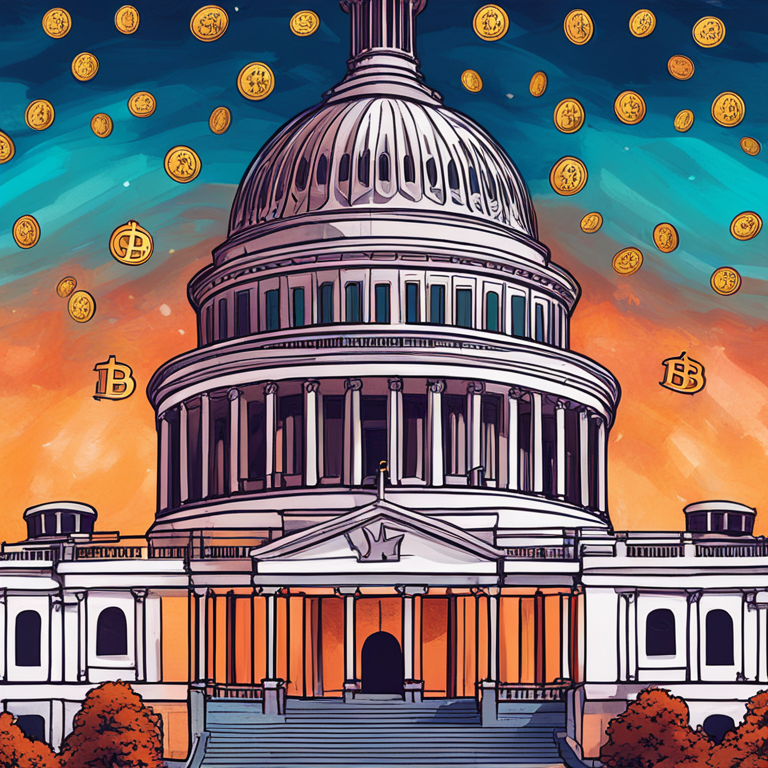Breaking: Despite Warren's Concerns, Senate Passes Crypto Bill Allowing Banks to Hold Bitcoin
- byAdmin
- 16 May, 2024
- 20 Mins

Introduction
Breaking news, folks – the Senate has sent shockwaves through the crypto world today! Despite Senator Elizabeth Warren waving her caution flag high in the air, the Senate has passed a groundbreaking crypto bill that will allow banks to hold Bitcoin. Yep, you read that right – your friendly neighborhood bank might soon be more than just the keeper of your fiat money. This move has ignited a fiery debate about the future of digital assets in the financial system. But let's dive deeper into the story, shall we?
Senate passes crypto bill

In an unexpected twist, the Senate has embraced the crypto revolution by passing a bill that allows banks to provide custody services for Bitcoin and other cryptocurrencies. Picture this: your local bank, which you trust with your hard-earned dollars, now potentially holding onto your digital gold too. Despite heavy opposition from Senator Elizabeth Warren, who has repeatedly voiced concerns over the security and volatility of digital assets, the bill moved forward with surprising momentum. In her passionate plea, Warren argued that banks might not be fully prepared to handle the complexities and risks associated with cryptocurrencies. However, her colleagues seemed persuaded by the promise of integrating these digital assets into the traditional banking system. The idea is to bring some legitimacy and mainstream acceptance to cryptocurrencies, which, until now, have often been viewed with a mix of fascination and skepticism.
Overview of the bill
So, what exactly is in this bill that's got everyone talking? Essentially, it opens the door for highly regulated financial institutions to step into the world of cryptocurrencies, offering custody services for Bitcoin and potentially other digital assets. The aim is to provide a secure and regulated environment for individuals and businesses to store their cryptocurrencies. The bill emphasizes stringent security protocols, transparency, and accountability, ensuring that banks adhere to the highest standards of safety. This could be a game-changer, giving a significant boost to the credibility of cryptocurrencies by associating them with trusted financial institutions. However, it also raises questions about how well these banks can manage the unique challenges that come with digital assets, such as hacking risks and the need for robust cybersecurity measures. The proponents of the bill argue that bringing cryptocurrencies under the purview of regulated banks could mitigate these risks significantly.
Impact on banks
Now, let's talk about the banks themselves. What does this new bill mean for them? For starters, it could open up a new revenue stream as more customers might flock to banks for their crypto custody needs. However, it's not all sunshine and rainbows. Banks will need to invest heavily in new infrastructure, training, and security measures to ensure they can handle these digital assets safely. This new venture is like jumping into a pool of uncertainties – exciting but a tad risky. Banks will have to beef up their cybersecurity teams, update their tech protocols, and ensure they comply with a myriad of regulations designed to safeguard customers' assets. On the flip side, this move could also make banks more appealing to the tech-savvy younger generation who are more inclined towards using cryptocurrencies. The potential for growth is enormous, but the execution will be crucial. After all, no one wants to be the bank that lost someone's Bitcoin stash in a cyber heist!

Warren's concerns
In a move that's stirred the crypto cauldron, U.S. Senator Elizabeth Warren urged her colleagues to pump the brakes on proposed legislation that would allow regulated financial companies to offer custody services for Bitcoin (BTC) and other cryptocurrencies. Warren's objections focus on the safety and security of cryptos in the grip of traditional banks. Call it the clash of the titans – the age-old financial institutions versus the new kids on the blockchain. This debate is turning heads as the financial system grapples with the integration of digital currencies. Let’s dive into why Warren's so concerned and what this means moving forward.

Safety and Security Issues
Warren's worries aren't totally out of left field. She's primarily concerned about how secure cryptocurrencies can be when handled by banks. Think of it like asking a cat to guard the canary – can we really trust traditional banks, with their history of crashes and hacks, to keep our digital gold safe? According to Warren, crypto-assets are particularly vulnerable to cyber-attacks and unauthorized access. She argues that banks don’t yet have the iron-clad cybersecurity measures required to keep hackers at bay. So, while some enthusiasts are wrapped up in the possibilities of this new bill, Warren is waving the red flag, saying, “Hold your horses, folks!”
Regulatory Challenges
On top of safety, there are regulatory hiccups to consider. Warren's ringing the alarm bell on the regulatory framework surrounding this mix of crypto and banking. It’s like trying to fit a square peg in a round hole – the existing laws aren’t quite designed for this new financial frontier. Warren argues that without proper regulatory measures, allowing banks to handle cryptocurrencies could open Pandora's box of financial inconsistencies and loopholes. She emphasizes the need for new, robust regulations to prevent potential misuse and fraud. It’s a maze of legal headaches, and Warren’s not convinced we’ve got the right map just yet.
Broader debate on cryptocurrencies
Integration into Financial System
For every Warren out there, there are numerous voices calling for the seamless integration of cryptocurrencies into the financial system. Proponents argue that by allowing banks to hold and manage crypto-assets, they'll be adding a layer of trust and stability. Essentially, it would bring cryptocurrencies into the mainstream financial fold, hopefully calming those wild crypto market swings. Imagine being able to store your Bitcoin in your local bank alongside your traditional savings account – it sounds almost too futuristic! However, the road to this utopia is paved with regulatory speed bumps and security concerns. But hey, Rome wasn't built in a day.
Stakeholder Opinions
Opinions are as divided as a blockchain ledger. On one hand, you've got the old guard, like Warren, voicing serious reservations. On the other hand, tech-savvy millennials and crypto enthusiasts are all for it, citing increased trust and broader acceptance of digital currencies. Those in favor highlight the potential for innovation within traditional banking, arguing that banks have the resources to develop robust security protocols given the chance. Conversely, skeptics worry this is a slippery slope, potentially leading to another financial catastrophe. It's a mixed bag, folks, and only time will tell who gets to say, “I told you so.”

Senate passes crypto bill allowing banks to hold Bitcoin
Imagine if your bank offered you the option not just to handle your dollars, but also your Bitcoins. Sounds like something out of a sci-fi movie, right? Well, as of today, it's becoming reality! Despite Senator Elizabeth Warren's fierce opposition, the Senate just passed a groundbreaking crypto bill allowing banks to hold Bitcoin and other cryptocurrencies. Sit tight, folks, because the financial world is about to get as electrifying as a summer blockbuster.
Senator Warren's concerns are understandable. I mean, handing over the keys to the Bitcoin kingdom to traditional banks could be seen as risky business. She argues that the safety and security of digital assets in the hands of financial institutions aren't quite as bulletproof as a superhero's cape. Warren's been vocally wary, urging her Senate colleagues to think twice before giving the green light to this legislation. After all, isn’t it better to keep your crypto safe at home in your digital wallet, rather than letting it lounge around in a bank vault?
Here's the kicker: the bill suggests highly regulated banks will now be able to provide custody services for Bitcoin and other cryptocurrencies. You heard it right – the big suits can now take your cryptos under their wing. The legislation has triggered a heated debate, reminiscent of an old Western showdown, on how precisely these digital cowboys should be integrated into the financial system. Navigating this new terrain, lawmakers must ensure they don’t end up in a digital Wild West.
So, what's next? Well, the financial institutions are going to need to gear up Batman-style. We're talking tech upgrades, state-of-the-art security systems, and a bunch of crypto-savvy staff. The banks' move into crypto custody services means more than just a new line item on a menu; it's like adding a new wing to the building and making sure it’s tornado-proof. With additional layers of regulation and security measures, banks will need to keep up with the fast-paced nature of digital assets to ensure they're offering a fortress-like safe haven for your precious Satoshis.
On one hand, proponents of the bill argue that having banks in the crypto custody game lends an air of legitimacy and stability to the digital currency market. Think of it as Batman and Robin swooping in to save the day, bringing trusted protocols and security to the sometimes murky world of crypto. On the other hand, skeptics like Warren worry that these traditional institutions may not be equipped to handle the complexities and security flaws often associated with cryptocurrencies.
Moreover, the introduction of banks into the crypto domain potentially means more trust from wary investors. The very people who’ve been cautious about jumping into the crypto pool might now be dipping their toes in, given the involvement of regulated financial behemoths. However, Warren's cautionary points about safeguarding digital assets remain pertinent. As enticing as it might seem to centralize crypto holdings with banks, each step will need to be meticulously measured to avoid unleashing a Pandora’s box of digital challenges.
In conclusion, this legislative development is a significant milestone for the intertwining worlds of traditional banking and the dynamic, volatile domain of cryptocurrency. Whether you see it as entering a brave new world or opening a can of worms, one thing’s for sure: the conversation around cryptocurrency just got a whole lot more interesting. So, buckle up and stay tuned, as we watch how this digital frontier unfolds in the trusted, yet cautious, hands of your neighborhood bank.
Ethan Taylor
Ethan Taylor here, your trusted Financial Analyst at NexTokenNews. With over a decade of experience in the financial markets and a keen focus on cryptocurrency, I'm here to bring clarity to the complex dynamics of crypto investments.



